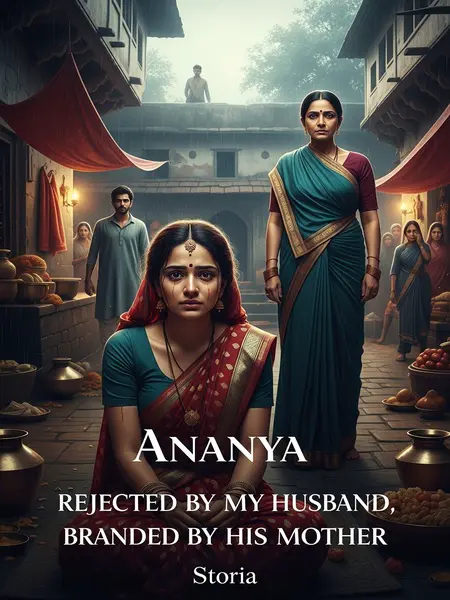Chapter 2: The Burden of Honour
Everyone said I was the luckiest girl in the area.
Neighbours would peek through their windows, whispering, “Dekho, Ananya is going to be a Collector’s wife!” Women at the well would smile, hiding their envy behind kind words. The air buzzed with expectations.
After I married Rohan Sharma, it was as if he’d suddenly been enlightened.
The relatives who once looked down on my plain saris now invited me for tea, eager to be seen with the Collector’s wife. The village elders would nod in approval, their eyes lighting up whenever my name was mentioned in connection with his success.
In three years, he became a state-level rank holder. In six, he cleared the UPSC.
The whole district celebrated when his name appeared in the newspaper. Sweets were distributed, temple bells rang, and Amma’s eyes glistened with pride as the whole mohalla came to offer their blessings.
At twenty-seven, he was appointed District Collector in a wealthy region of Maharashtra.
It was as if our fates had been rewritten overnight. I traded my cotton salwar-kameezes for crisp saris, learned to smile politely at dignitaries, and tried to hold my head high in gatherings where I barely understood half the conversations.
I, too, transformed from a farmer’s daughter into the wife of a District Collector.
Every introduction was now tinged with respect, sometimes even awe. But in the privacy of my own mind, I still felt like the village girl who had once struggled to keep her school books dry during the rains.
But those ten-odd years that everyone envied were not happy for me.
Behind the locked doors and closed curtains, no one saw the loneliness that ate away at me, the cold silences that filled our government bungalow. Happiness was something I only heard about in the laughter of others.
My mother-in-law never liked me.
In fact, her disapproval only grew with time. She kept finding new reasons to complain—about the way I cooked, the way I folded the bedcovers, the way I even breathed, sometimes.
She had raised Rohan alone as a widow, cherishing him as if he were her very eyes.
He was her whole world—her only pride, the only reason she could walk in the bazaar with her head held high. She would often sit by the window, talking to his childhood photograph, as if he were still a little boy.
In her heart, her son was a star descended from heaven, worthy of marrying a princess.
She never hid her disappointment. "My Rohan deserves a girl who can bring more respect to this family," she’d say, loud enough for the neighbours to overhear. Each word left a bruise on my heart.
“My Rohan is really unlucky.”
She would sigh dramatically, shaking her head at every family function. “He is such a good boy, and see the fate he got!”
“A dignified Collector, yet his main wife is an illiterate village girl.”
She never let anyone forget my humble beginnings, always reminding everyone that I was not fit for her son. Sometimes, I wondered if she even realised how much those words hurt.
“I’m too embarrassed to visit others. Which of those officers’ wives isn’t the daughter of a big family?”
Whenever she returned from a tea party, her complaints would double. “Look at Mrs. Deshmukh, so cultured. And me? What face do I have to show, haan?” She’d stare at me as if I was the reason for all her humiliation.
So she tried every way to torment me.
If I ever smiled too brightly, she would find some chore for me to do. Even on festivals, while other bahus received gifts, I would get a list of extra tasks.
In eighteen years of marriage, I never once ate at the same table with Rohan.
While other couples would share quiet conversations over meals, my place was always in the kitchen, waiting for everyone else to finish. Even during Diwali, when families sat together, I would eat alone, my food already cold.
When we were in the village, every time I finished cooking, my mother-in-law would send me off to do other chores—
She would stand at the threshold, ladle in hand, barking orders—“Ananya, go cut fodder for the cow! Don’t forget to sweep the veranda. The chickens haven’t been fed. And, oh, the firewood is running low!”
Cutting fodder, feeding chickens, sweeping the courtyard, chopping firewood, hauling water.
My hands were rough from constant work, my sarees always stained at the knees. Sometimes, by the time I finished everything, the sun would already be dipping behind the banyan tree, the air thick with the scent of evening incense.
There was never an end to the work at home.
No matter how fast I moved, there was always something more—something left undone, for which I would be scolded later. Even during festivals, when other homes echoed with laughter, ours rang with my mother-in-law’s complaints.
Often, by the time I returned to the kitchen, sweaty and exhausted, only a cold roti and half a plate of achaar remained for me.
I would sit on the floor, back aching, tears stinging my eyes as I chewed my meal in silence. Sometimes, even the pickle seemed too sour, but I swallowed everything, including my anger.
When my husband became an officer, my mother-in-law said that in big households, bahus had to stand and serve their saas during meals.
She made a big show of it whenever guests came, praising my ‘good manners’—all while I stood in the background, ignored. “See, our Ananya knows her place,” she’d say, beaming with pride as I forced a smile.
I was still eating leftovers—the only difference was that the dishes were better than in the village.
Now there was paneer and pulao, but my plate was always scraped clean by others first. The shiny steel thali mocked my hunger, and the expensive crockery changed nothing.
When we were poor, after eating, my husband would bury himself in his room to study.
Rohan rarely spoke to me, even when we shared the same roof. The only sounds from his room were the pages turning and the scratching of his pen as he prepared for another exam.
As for household matters, he always ignored them, focusing only on reading the law books.
He seemed to believe that the world outside was his true responsibility, while anything inside the house was beneath his notice. My struggles, my tears, were invisible to him.
Our home had only three rooms: one for the main hall, one for my mother-in-law, and one for my husband.
I would sleep on a narrow mattress in the corner, listening to their voices carry through the thin walls. Some nights, I would stare at the ceiling, counting the cracks and praying for morning to come quickly.
But my mother-in-law wouldn’t let me live with my husband, saying she was afraid I’d disturb his studies.
She enforced her rules with an iron fist. “No distractions!” she would snap, pushing me out of the room if I lingered too long by the door. Rohan never protested.
She even set a schedule for us to share a bed—twice a month, no more, no less.
It was like rationing happiness—something to be measured, controlled. I would wait for those two nights with equal parts dread and hope.
In her own room, she made a simple small bed out of a door panel and two long stools.
The bed creaked with every movement, its wooden planks digging into my back. Sometimes, I wondered if it was punishment for something I had done in a past life.
On that creaky makeshift bed, I slept for nine years.
Each night, the shadows would creep across the wall, bringing with them old fears and new worries. Sleep was a luxury I could seldom afford.
For nine years, I can’t remember how many times I got up at night—
There was always a reason—her legs cramped, her water glass empty, her back aching. My eyes would ache from lack of sleep, but I never dared refuse her.
To bring her water, empty her lota, massage her legs, rub her shoulders.
Each task was accompanied by criticism—“Can’t you do it more gently? You’re always so clumsy!” I would massage her tired feet, watching the clock, longing for dawn.
In winter, she said it was cold and made me heat the room; in the middle of the night, she’d complain it was too hot and order me to put out the fire.
The small heater would flicker, making the air stuffy, but if I tried to sleep, she would wake me, grumbling about the heat. “What are you, made of stone? Don’t you feel the cold?” she’d snap, even as sweat trickled down my neck.
In summer, she made me sit by her side, waving a hand fan to chase away mosquitoes.
My arms would ache from the effort, the fan heavy in my hand, but I dared not slow down. Outside, the street dogs howled and the ceiling fan groaned uselessly above us.
I fanned her all night long.
Sometimes my mind wandered to the life I could have had—one where I slept through the night, woke up rested, smiled without fear. But those dreams always slipped away before morning.
Even after following my husband to Maharashtra, I still slept in my mother-in-law’s room.
She refused to change her ways, insisting that no one could care for her like I did. Even in the big city, with its wide roads and tall buildings, my world remained small and confining.
She didn’t want maids to serve her, claiming they were clumsy and not as attentive as I was.
If a maid spilled a drop of tea, she would rant for hours. “Only Ananya knows how to take care of me,” she would announce, making sure everyone heard her loyalty was not by choice, but by necessity.
Since marrying Rohan, I never had a full night’s sleep.
Even when exhaustion threatened to break me, there was always something that kept me awake—the sound of her breathing, the fear of being called upon, or the ache of loneliness.
After Rohan became an officer, he took two mistresses and three personal attendants who also served as bed companions.
It was an open secret—people gossiped in hushed voices, pretending not to see the signs. I would catch glimpses of them in the corridors, their laughter echoing in the empty rooms.
The mistresses were jealous, and he was too busy to care about me.
They watched me with narrowed eyes, as if I were an unwanted guest in my own home. Rohan, meanwhile, buried himself in his work, leaving me alone with my thoughts.
“Aiyo, Aunty Radha, congratulations, congratulations!”
The lane outside was buzzing with excitement. Women in bright saris clustered at the gate, craning their necks to catch a glimpse of the proceedings. The aroma of fresh jalebis from the sweet shop mixed with the scent of marigolds and incense.
Amid the neighbours’ cheerful blessings, Uncle Sharma led a group of people carrying two loads of wedding gifts into our courtyard.
The gifts—stacked high with boxes wrapped in shiny paper, trays of dry fruits, and a brand new pressure cooker—glinted in the late afternoon light. Children darted between legs, trying to sneak a sweet or two. The milkman, Ramesh chacha, and Sunita aunty from the next lane lingered at the boundary wall, eager for a peek.
My hands fell limply to my sides as I closed my eyes in resignation.
I let out a slow breath, steadying myself. The din outside felt far away—like I was watching a scene from someone else’s life. My palms grew sweaty, the edge of my dupatta twisted between my fingers.
Forget it.
What was the use of hoping for a miracle? The outcome was already written in the stars—or, as my grandmother would say, in the lines of my palm.
If I don’t marry Rohan, what better fate could I hope for?
In our world, options for girls like me were as limited as the number of chappatis in a poor man’s tiffin. Dreams were a luxury we couldn’t afford.
For a village girl, having a husband who doesn’t beat or scold you is already the greatest luck.
This was the wisdom whispered at every women’s gathering—one had to be grateful if her husband kept his voice low and his hands to himself. That was considered happiness.
As for work—who doesn’t work after marriage?
The endless chores, the aching back, the burnt rotis—these were part and parcel of every woman’s life. No one complained, because complaining never changed anything.
Who doesn’t endure a mother-in-law’s temper?
Even the richest bahus grumbled about their saas. It was a universal truth, passed down from one generation to the next, like family recipes and old saris.
After becoming a Collector’s wife, I learnt that even girls from wealthy families don’t live as glamorously as they seem.
Beneath the glittering saris and gold jewellery, there were bruises hidden, tears wiped away quickly, smiles that never reached the eyes. Rich or poor, sorrow found its way into every home.
When they’re young, they must compete with half-sisters, helping their own mothers vie for their father’s favour.
The stories of rivalry and jealousy—sometimes whispered, sometimes shouted—were as old as the village itself. “If you don’t fight for your share, you get nothing,” the older women would say, as if it were gospel.
With favour comes a bigger dowry and a better marriage.
The dowry lists grew longer with every passing year, each item a marker of status. Families saved for decades just to secure a decent match for their daughters.
After marriage, they have to fight with mistresses and their mother-in-law.
Even the grandest homes were battlegrounds—skirmishes fought over attention, respect, and scraps of affection. The politics of the inner courtyard were as ruthless as any battlefield.
If they win, they secure more for their children.
Winning meant better schools, nicer clothes, more security for the next generation. Losing meant being forgotten, your children pushed to the sidelines.
Everyone has their own hardships.
No woman’s story is free from pain. Some bear it in silence, others scream into their pillows at night, but all of us carry it somewhere in our bones.
In this world, it’s not easy for women to survive.
We are trained to endure, to smile through tears, to hide our pain behind a veil of modesty and obedience. That’s what Amma always said: “Himmat rakh, beti. Strength is a woman’s only jewellery.”
Besides, if I rashly broke off the engagement, my parents would probably be drowned in villagers’ gossip.
Nothing travels faster than rumour in a village. One scandal, and your family’s honour is dragged through the mud, your sisters’ chances ruined for good.
Let it be.
Better to swallow my pride than see my parents shamed. That, too, is a kind of love.
At least I’m already familiar with the Sharma family’s ways—I can always find ways to make life more bearable for myself.
I reminded myself of the small comforts I could carve out—an extra sweet at Diwali, a stolen moment of peace in the early mornings, the warmth of Amma’s hug when I visited home.
“I do not agree to this marriage!”
The words rang out, shattering the uneasy calm. Every head turned towards the entrance, eyes wide with shock.
A sharp, rough female voice exploded in the courtyard like a clap of thunder.
Even the neighbourhood dogs fell silent, their ears perked as the whole lane strained to hear. I felt a chill run down my spine.
My mother-in-law’s voice?
My breath caught in my throat. Could it really be her? What was she doing here?
I shot to my feet in astonishment and rushed to the door in three steps.
My legs felt weak, but I forced myself to move. Each step echoed like a drumbeat—my heart thudding in my chest.
Sure enough, my mother-in-law stood in the courtyard.
Her figure was unmistakable—thin but upright, defiant as ever. Even surrounded by a crowd, she seemed utterly alone, her eyes blazing with purpose.






